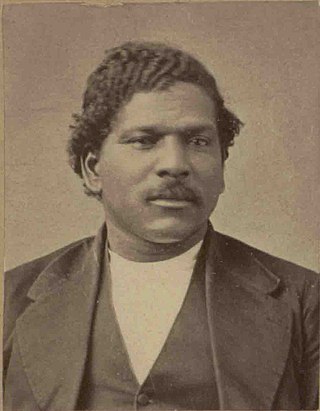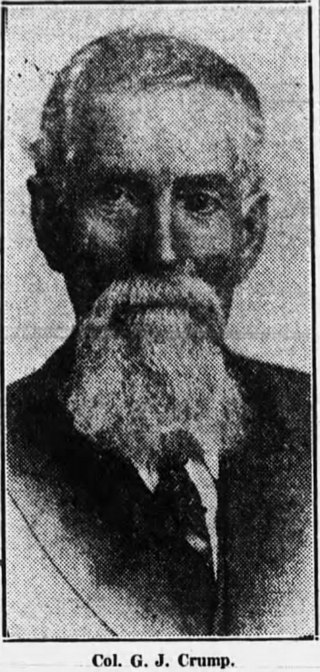Related Research Articles

Jesse M. Martin was best known as the acting governor of the U.S. state of Arkansas from January 11, 1909, to January 14, 1909. Senator Martin served as Acting Governor of Arkansas for three days until the inauguration of Governor George W. Donaghey.
James Gordon Frierson was a state representative in Arkansas in 1871 and was re-elected for a second term. He also served at the 1874 Arkansas Constitutional Convention. He established a high school. He was elected a judge. He married and had 3 children.
Archer (Archie) Shepperson was a teacher, principal, and state legislator in Arkansas. He served in the Nineteenth General Assembly in 1873.
George W. Prigmore was a state legislator and government official in Arkansas. He served in the Eighteenth Arkansas Legislature in 1871. He married Anna Elliott.

William C. Payne was a state legislator in Arkansas. He represented Jefferson County, Arkansas, in 1879 and 1881.
Napoleon B. McPhetridge was a lawyer, county examiner, and state senator in Arkansas. He was elected in 1880.

Ed Glover was a state legislator in Arkansas. He represented Jefferson County, Arkansas in the Arkansas House of Representatives in 1885. He was a Republican, representing Jefferson County, Arkansas.
Toney Grissom or Tony Grissom was a Baptist minister, farmer, and state legislator in Arkansas. His employer owed him money after he left and then had him "silenced" from preaching after Grissom sued him for it. A Republican, he represented Phillips County, Arkansas for two terms in the Arkansas House of Representatives from 1873 until 1875.
Crockett Brown was a state legislator in Arkansas. He served in the Arkansas House of Representatives representing Lee County, Arkansas in 1877. He served from the county with Patrick T. Price.
Capital Hill Colored School, also known as Capital Hill School, was a school for African American students in Little Rock, Arkansas at Eleventh Street and Wolfe Street. An engraving was made of the school.. It served students up through high school.

Matthew McClintock Duffie was a teacher, lawyer, officer in the Confederate Army, state legislator, and diplomat from Arkansas. A Democrat, he served as president of the Arkansas Senate.
Oliver H. Oates was a lawyer, judge, and state legislator in Arkansas. He served as Speaker of the Arkansas House of Representatives from 1858-1859. From November 1860-November 1862 during the American Civil War, he served as Secretary of State of Arkansas.
Dr. Benjamin P. Jett was an American officer and state legislator in Arkansas.
M. J. Mulkey was a state senator in Arkansas. He served in 1877 and 1879 representing Little River, Sevier, Howard, and Polk counties.

George James Crump was an officer in Confederate Army during the American Civil War, a lawyer, a state legislator for one term in the Arkansas House of Representatives and a public official. He also went by the name G. J. Crump.
Joseph Warren House was a lawyer in Little Rock, Arkansas, a state legislator, and a United States District Attorney. He served in the Arkansas Senate.
Walton Watkins was an officer during the American Civil War and an official in the Arkansas Senate.

David E. Barker was a plantation owner and politician in Arkansas. He served in the Arkansas Senate including as President of the Arkansas Senate.
Rally Hill is an unincorporated community in Boone County, Arkansas, United States.
Charles Minor was a lawyer and politician in Arkansas. He served in the Arkansas House of Representatives. He served two terms in the Arkansas House. He testified he lived in Jackson County.
References
- ↑ Hempstead, Fay (January 30, 1911). "Historical Review of Arkansas: Its Commerce, Industry and Modern Affairs". Lewis Publishing Company – via Google Books.
- ↑ Hempstead, Fay (January 30, 1890). A Pictorial History of Arkansas: From Earliest Times to the Year 1890 ... Southern Historical Press. ISBN 9780893080747 – via Google Books.
- ↑ Senate, Arkansas General Assembly (January 30, 1871). "Journal of the Senate of Arkansas" – via Google Books.